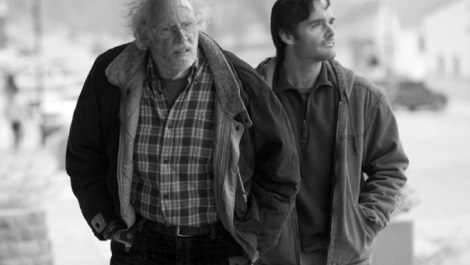Nebraska Reaction: Cannes 2013
Alexander Payne returns with a fine-tuned road movie.

Operating in small, intimate mode, Alexander Payne unfurls a bittersweet road movie that again showcases his ability to blend the bitter with the sweet.
Nebraska is unlikely to attract the box office rewards or Academy attention of his last film, The Descendants , starring George Clooney – it’s shot in low contrast black-and-white and gifts its father-son leads to Bruce Dern and Will Forte – but it is altogether superior.
Dern plays Woody Grant, a Montana resident who begins the movie shuffling along the highway until he’s retrieved by the sheriff. His proposed destination, delightfully, is Nebraska, and it seems he doesn’t even have a lawnmower to get him there.
But get there he will, for in his pocket, folded carefully, is a letter informing him that he’s won a million dollars in a sweepstake, and no amount of admonishment from his plain-speaking wife (June Squibb) will alert him to the hoax.
Son David (Forte) is more forgiving of his father’s pipe dream (and understanding of his stubbornness), and soon resigns himself to phoning in sick and delivering the old codger himself.
Dern, inevitably, is wonderful as Woody, a man slipping into dementia whose old-time values insist that something written must be true. When he gets his money, all he wants to do with it is buy a new pick-up truck and replace the compressor a friend ‘borrowed’ in ’74.
And Forte – who should be enjoyed now before he next pops up as a male cheerleader in Grown Ups 2 – brings also an innate goodness to his role, his patient, open face fitting David perfectly as he learns to accommodate his old man’s nonsense before it’s too late.
Sign up for the Total Film Newsletter
Bringing all the latest movie news, features, and reviews to your inbox
But Nebraska is anything but saccharine. With the protagonists forced to rest up for a few days in the Nebraskan town where Woody grew up, the film grows roots, deepening into an affecting study of family, loyalty and memory as old compatriots crawl out of the decaying woodwork, not all of them kindly.
To compare Nebraska to David Lynch’s The Straight Story or Peter Bogdanovich’s The Last Picture Show (here, as there, a mythic dimension resides) is to over-hype and to burden future viewers with unfair expectations. Its resonance is slighter, its quality lesser.
But it does map similar paths and themes with composedly sure footing, and Phedon Papamichael’s ( The Ides Of March , Walk The Line ) monochrome images of flat landscapes, square buildings and lived-in faces with eyes as wide as the Nebraskan streets linger long after the credits roll.
Jamie Graham is the Editor-at-Large of Total Film magazine. You'll likely find them around these parts reviewing the biggest films on the planet and speaking to some of the biggest stars in the business – that's just what Jamie does. Jamie has also written for outlets like SFX and the Sunday Times Culture, and appeared on podcasts exploring the wondrous worlds of occult and horror.


